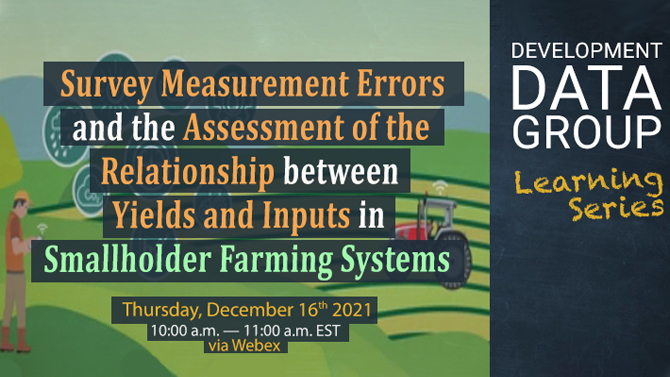An accurate understanding of how input use affects agricultural productivity in smallholder farming systems is key to designing policies that can improve productivity, food security, and living standards in rural areas. Studies examining the relationships between agricultural productivity and inputs typically rely on land productivity measures, such as crop yields, that are informed by self-reported survey data on crop production. This seminar reports the findings from a recent working paper that leverages unique survey data from Mali to demonstrate that self-reported crop yields, vis-à-vis (objective) crop cut yields, are subject to non-classical measurement error that in turn biases the estimates of returns to inputs, including land, labor, fertilizer, and seeds. The analysis validates an alternative approach to estimate the relationship between crop yields and agricultural inputs using large-scale surveys, namely a within-survey imputation exercise that derives predicted, otherwise unobserved, objective crop yields that stem from a machine learning model that is estimated with a random subsample of plots for which crop cutting and self-reported yields are both available. Using data from a methodological survey experiment and a nationally representative survey conducted in Mali, the analysis demonstrates that it is possible to obtain predicted objective sorghum yields with attenuated non-classical measurement error, resulting in a less biased assessment of the relationship between yields and agricultural inputs. The seminar will expand on the implications of the findings for (i) future research on agricultural intensification, and (ii) the design of future surveys in which objective data collection could be limited to a subsample to save costs, with the intention to apply the suggested machine learning approach.
Events
DECDG Learning Series: Survey Measurement Errors and the Assessment of the Relationship between Yields and Inputs in Smallholder Farming Systems
December 16-November 16, 2021
online (via Webex)
Event Details
- Date: December 16, 2021
- Time: 10:00 am - 11:00 am ET
- Location: Online (via Webex)




